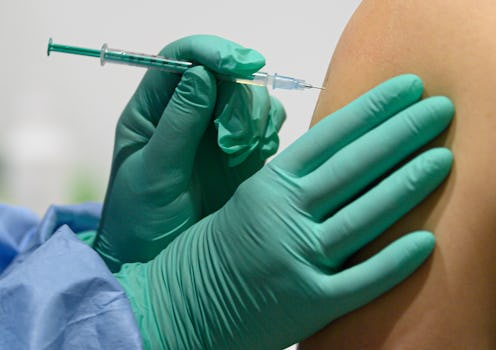Health
Doctors Explain How To Deal With COVID Vaccine Side Effects
Be prepared to be sleepy.

Getting a COVID-19 vaccine is going to be the highlight of 2021 for millions, because man are we all tired of sitting inside. But it's likely that when you get those two jabs, spaced a few weeks apart, you'll come away with more than just a bandaid and a happy immune system (and hopefully a lollipop). Both the Pfizer and Moderna vaccines might cause short-term side effects, according to FDA data from their clinical trials. While the aches and pains will go away relatively quickly, experts say it's still a good idea to prepare for the side effects of getting vaccinated.
What Are The COVID Vaccine's Side Effects?
“There are two types of COVID-19 vaccine side effects," Dr. Teresa Bartlett M.D., senior medical officer at medical claims company Sedgwick, tells Bustle. "Local side effects are more common, and involve redness, swelling and perhaps some lymph node swelling in the vaccinated arm." The other kind is systemic, and involves your entire body. "It can cause fever, chills, and body aches," Bartlett says, adding that it's more common with the second vaccine dose and tends to happen in people under age 55, per the CDC's data.
Fatigue, muscle pain, joint pain, and headaches were all reported as systemic side effects among people in the Pfizer and Moderna vaccine trials. Dr. Robert Mordkin M.D., chief medical officer at testing company LetsGetChecked, tells Bustle that both the local and systemic symptoms are self-limiting, which means that they'll go away on their own within a day or so. They're a sign that your immune system is reacting to the vaccine by producing antibodies, so they're a good thing.
How To Prepare For COVID Vaccine Side Effects
Second-dose side effects are pretty common. Science reported in 2020 if you got side effects from your first dose, it's likely that you'll experience them strongly after the second dose. Dr. Peter Hotez, M.D. M.P.H., dean of the National School of Tropical Medicine at Baylor College, told Vox in December that many people who experience these strong side effects will probably not be willing or able to go to work on the day of their vaccine, so you should plan your second dose for a day off or a weekend if you can.
"I did pre-medicate with Benadryl [before the vaccine appointment] just in case," Dr. Satya Upadhyayula M.D. M.P.H., a clinical assistant professor of internal medicine at KU Medical Center at the University of Kansas, tells Bustle. "I wanted to be cautious given my history of anaphylaxis, and I continued to take my daily allergy medication." (People with a history of serious allergic reactions need to talk to their doctors before getting the COVID-19 vaccine.) Her first dose was swift and easy — "less pain than the flu shot!" — and she had no side effects, but after the second dose on Jan. 7, she experienced aches, fevers, and fever shakes, called rigors. They lasted less than 24 hours. "It was like a flip switched in the middle of the day," she says.
If you get local reactions, like swelling where you got the jab, Dr. Kathleen Jordan M.D., senior Vice President of Medical Affairs at healthcare company Tia, recommends taking Tylenol or ibuprofen to help manage the pain, and holding ice or cool cloths on the injection site. She adds that stretching the arm and doing some relaxation and mindfulness exercises might also help. "For the systemic reactions, drink a lot of fluids, get good rest, and take Tylenol and ibuprofen as needed,” Dr. Bartlett says. Ultimately, these are expected reactions, and should pass.
Pre-medicating before your vaccination appointment might not be advisable, though. "There's been some controversy about taking an NSAID [a non-steroidal anti-inflammatory drug, like ibuprofen] prior to getting the vaccine, as apparently it's unclear if it can affect the immune response," Dr. Upadhyayula says. Dr. William Schaffner M.D., professor in the division of infectious diseases at the Vanderbilt University School of Medicine, told Health in December, "We don't think [NSAIDs] would impair your immune response, but we don't want to take any chances."
"The CDC is also asking individuals to report and track their individual experience through an information system called V-Safe," Dr. Jordan says. Opting-in to use the app will help the CDC learn more about the vaccine side effects as the rollout becomes more widespread.
When To Worry About COVID Vaccine Side Effects
There are some side effects you should look out for. “When someone has a severe reaction to the vaccine, such as difficulty breathing or a full body rash, it is a cause for concern and they should seek medical care immediately," Dr. Bartlett says. This could signify that you're allergic to something in the vaccine itself, which might mean you're not eligible for a second dose. Nearly 30 cases of vaccine-related anaphylaxis have occurred in the U.S., per the CDC, but it's still very rare; if you have a history of severe allergic reactions, it's a good idea to chat to your doctor about your vaccine options. Dr. Mordkin says feelings of severe weakness, numbness, and lightheadedness all need immediate medical attention too. Otherwise, stock up on pain relief for after each jab, and prepare for a day of headaches and shivers.
Experts:
Dr. Teresa Bartlett M.D.
Dr. Kathleen Jordan M.D.
Dr. Robert Mordkin M.D.
Dr. Satya Upadhyayula M.D. M.P.H.